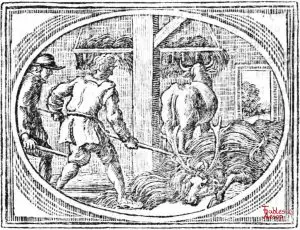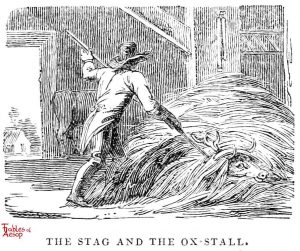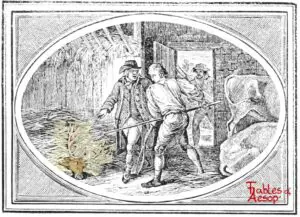A stag, fleeing, hid in a stable by burying itself in the hay. Stag left a horn showing and the Master saw. No more stag.
Nothing escapes the master’s eye.

Eliot/Jacobs Version
A Hart hotly pursued by the hounds fled for refuge into an ox-stall, and buried itself in a truss of hay, leaving nothing to be seen but the tips of his horns. Soon after the Hunters came up and asked if any one had seen the Hart. The stable boys, who had been resting after their dinner, looked round, but could see nothing, and the Hunters went away. Shortly afterwards the master came in, and looking round, saw that something unusual had taken place. He pointed to the truss of hay and said: “What are those two curious things sticking out of the hay?” And when the stable boys came to look they discovered the Hart, and soon made an end of him. He thus learnt that nothing escapes the master’s eye.

Townsend version
A stag, roundly chased by the hounds and blinded by fear to the danger he was running into, took shelter in a farmyard and hid himself in a shed among the oxen. An Ox gave him this kindly warning: “O unhappy creature! why should you thus, of your own accord, incur destruction and trust yourself in the house of your enemy?’ The Stag replied: “Only allow me, friend, to stay where I am, and I will undertake to find some favorable opportunity of effecting my escape.” At the approach of the evening the herdsman came to feed his cattle, but did not see the Stag; and even the farm-bailiff with several laborers passed through the shed and failed to notice him. The Stag, congratulating himself on his safety, began to express his sincere thanks to the Oxen who had kindly helped him in the hour of need. One of them again answered him: “We indeed wish you well, but the danger is not over. There is one other yet to pass through the shed, who has as it were a hundred eyes, and until he has come and gone, your life is still in peril.” At that moment the master himself entered, and having had to complain that his oxen had not been properly fed, he went up to their racks and cried out: “Why is there such a scarcity of fodder? There is not half enough straw for them to lie on. Those lazy fellows have not even swept the cobwebs away.” While he thus examined everything in turn, he spied the tips of the antlers of the Stag peeping out of the straw. Then summoning his laborers, he ordered that the Stag should be seized and killed.

Samuel Croxall
A STAG, roused out of his thick covert in the midst of the forest, and driven hard by the hounds, made towards a farm-house, and seeing the door of an ox-stall open, entered therein, and hid himself under a heap of straw. One of the oxen, turning his head about, asked him what he meant by venturing himself in such a place as that was, where he was sure to meet with his doom! Ah! says the Stag, if you will but be so good as to favour me with your concealment, I hope I shall do well enough; I intend to make off again the first opportunity. Well, he staid there till towards night: in came the ox-man with a bundle of fodder, and never saw him. In short, all the servants of the farm came and went, and not a soul of them smelt any thing of the matter. Nay, the bailiff himself came, according to form, and looked in, but walked away, no wiser than the rest. Upon this, the Stag, ready to jump out of his skin for joy, began to return thanks to the good-natured Oxen, protesting that they were the most obliging people he had ever met with in his life. After he had done his compliments, one of them answered him gravely: Indeed we desire nothing more than to have it in our power to contribute to your escape; but there is a certain person, you little think of, who has a hundred eyes; if he should happen to come, I would not give this straw for your life. In the interim, home comes the master himself, from a neighbour’s where he had been invited to dinner: and, because he had observed the cattle to look but scurvily of late, he went up to the rack, and asked why they did not give them more fodder; then, casting his eyes downward, Hey-dey! says he, why so sparing of your litter? pray, scatter a little more here. And these cobwebs—But I have spoken so often, that unless I do it myself—Thus, as he went on, prying into every thing, he chanced to look where the Stag’s horns lay sticking out of the straw; upon which he raised a hue-and-cry, called all his people about him, killed the poor Stag, and made a prize of him.
THE APPLICATION
The moral of this fable is, that nobody looks after a man’s affairs so well as he himself. Servants being but hirelings, seldom have the true interest of their master at heart, but let things run on in a negligent constant disorder; and this, generally, not so much for want of capacity as honesty. Their heads are taken up with the cultivation of their own private interest; for the service and promotion of which, that of their master is postponed, and often entirely neglected.
Few families are reduced to poverty and distress merely by their own extravagance and indulgence in luxury! the inattention of servants swells every article of expence in domestic economy; and the retinue of great men, instead of exerting their industry to conduce as far as possible to the increase of their master’s wealth, commonly exercise no other office than that of locusts and caterpillars, to consume and devour it.

Thomas Bewick (The Stag in The Ox-Stall)
A Stag, pursued by the hunters, took refuge in a stable, and begged of the Oxen, to suffer him to conceal himself under the straw in one of the stalls. They told him that he would be in great danger there, for both the master and the servants would soon come to fodder them, and then he might be sure of meeting his doom. Ah! says the Stag, if you will be so good as not betray me, I hope I shall be safe enough. Presently, in came a servant, who gave a careless look around, and then went out without any discovery. All the other servants of the farm came and went like the first. Upon this, the Stag began to exult, imagining himself quite secure; but a shrewd old Ox told him that he was reckoning upon his safety too soon, for there was another person to come, by whom he would not so readily be looked over. Accordingly, by and by came the master, who carefully peeped into every corner, and at last, in turning over the litter, discovered the Stag’s horns sticking out of the straw: upon which, he called all his servants back, and soon made prize of the poor creature.
APPLICATION.
This Fable is levelled against those worthless hirelings, who slide over their time in negligent disorder, and this not so much for want of capacity as honesty; their own private interest almost solely occupying their attention, while that of their master, whose wages they receive, and whose bread they eat, is postponed, or entirely neglected. Such servants deserve not to be inmates in any good man’s house; but where they are, it is absolutely necessary for the governors of families to look into their affairs with their own eyes; for though they may happen not to be in personal danger from the treachery of their domestics, they are perpetually liable to injuries from their negligence, which leaves the master open to the artifices of those who would defraud him. Few families are reduced to poverty merely by their own extravagance: the inattention of servants swells every article of expence in domestic economy; and the retinue of great men, instead of exerting their industry to increase their master’s wealth, commonly exercise no other office than that of caterpillars, to consume and devour it. The fate of the Stag also warns us not to engage in any hazardous speculation, the success of which is to depend upon the ignorance or carelessness of those with whom we have to deal; for though we may over-reach one or two, yet some master-eye is sure at last to pierce our covering of straw, and make us pay dearly for deviating from the straight road of honour and honesty.

JBR Collection
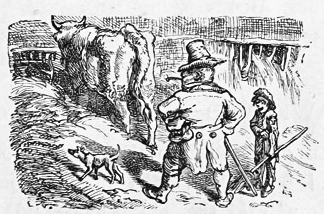
A Stag, hard pressed by the hounds, ran for shelter into an ox-stall, the door of which was open. One of the Oxen turned round, and asked him why he came to such a place as that, where he would be sure to be taken. The Stag replied that he should do well enough if the Oxen would not tell of him, and, covering himself in a heap of straw, waited for the night. Several servants, and even the Farm-Bailiff himself, came and looked round, but saw nothing of the Stag, who, as each went away, was ready to jump out of his skin for joy, and warmly thanked the Oxen for their silence. The Ox who had spoken first to him warned him not to be too sure of his escape, and said that glad as they would all be for him to get away, there was a certain person still to come whose eyes were a deal sharper than the eyes of any one who had been there yet. This was the Master himself, who, having been dining with a neighbour, looked in on his way home to see that all was right. At a glance he saw the tips of the horns coming through the straw, whereupon he raised a hue and cry, called all his people together, and made a prize of the Stag.

L’Estrange version (The Stag and The Oxen)
A stag that was hard set by the huntsmen, betook himself to a stall for sanctuary, and prevail’d with the oxen to conceal him the best they could, so they cover’d him with straw, and by and by in comes the keeper to dress the cattel and to feed them; and when he had done his work he went his way without any discovery. The stag reckon’d himself by this time to be out of all danger; but one of the oxen that had more brains than his fellows, advis’d him not to be too confident neither; for the servant, says he, is a puzzling fool that heeds nothing; but when my master comes, he’ll have an eye here and there and every where, and will most certainly find ye out. Upon the very speaking of the word, in comes the master, and he spies out twenty faults, I warrant ye; this was not well, and that was not well; till at last, as he was prying and groping up and down, he felt the horns of the stag under the straw, and so made prize of him.
Moral
He that would be sure to have his bus’ness well done, must either do it himself, or see the doing of it; beside that many a good servant is spoil’d by a careless master.

Crane Poetry Visual
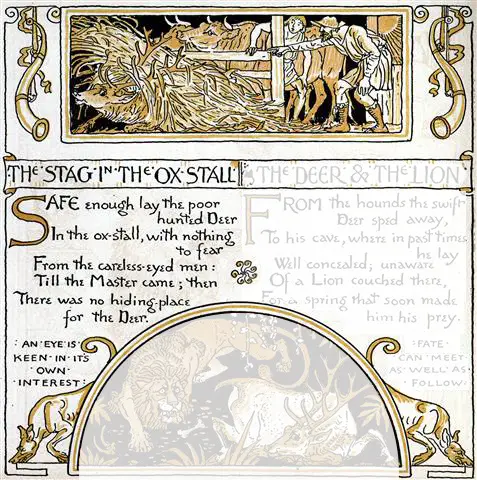
Safe enough lay the poor hunted Deer
In the ox-stall, with nothing to fear
From the careless-eyed men:
Till the Master came; then
There was no hiding place for the Deer.
An eye is keen in its own interest.

Cervus ad Stabulum Confugiens
Persecutus a canibus, cervus ad stabulum boum confugiebat et ibi totum corpus, praeterquam cornua, abscondebat. Adibat stabulum servus et ille, oscitanter et negligenter huc et illuc oculos circumferens, mox decessit. Fortunae suae nimis applausit laetabundus cervus et sese tutissimum autumabat. Sed statim, ipso hero ingrediente locum, et rebus curiosius perlustratis, cornua cervi detexit et fustibus cum vicinis adoriebatur.
Perry #492
